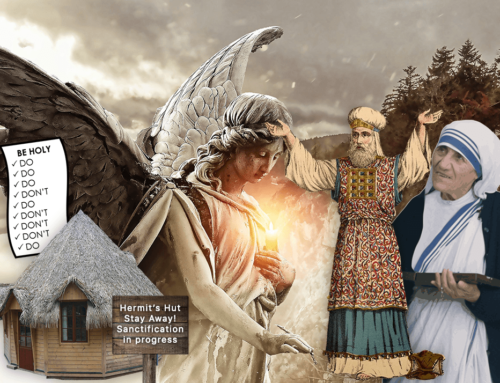 Early one morning, the scribes and Pharisees brought a woman caught in adultery to test Jesus, hoping to find grounds to accuse Him. Jesus responded to them, saying, “He who is without sin among you, let him be the first to throw a stone at her.” And one by one, her accusers walked away.
Early one morning, the scribes and Pharisees brought a woman caught in adultery to test Jesus, hoping to find grounds to accuse Him. Jesus responded to them, saying, “He who is without sin among you, let him be the first to throw a stone at her.” And one by one, her accusers walked away.
A little while later, Jesus proclaimed, “I am the Light of the world; he who follows Me will not walk in the darkness, but will have the Light of life.” The Pharisees balked at this, saying His testimony was untrue because He was testifying about Himself. Jesus then explained that His Father, who sent Him, also testified about Him, and that nothing He did was on His own initiative: He spoke as the Father taught Him and did what was pleasing to Him.
Many in the crowd did not understand, but some believed. And it was at this point that we read in John 8:31-36:
John 8:31 So Jesus was saying to those Jews who had believed Him, “If you continue in My word, then you are truly disciples of Mine; 32 and you will know the truth, and the truth will make you free.” 33 They answered Him, “We are Abraham’s descendants and have never yet been enslaved to anyone; how is it that You say, ‘You will become free’?”
John 8:34 Jesus answered them, “Truly, truly, I say to you, everyone who commits sin is the slave of sin. 35 “The slave does not remain in the house forever; the son does remain forever. 36 “So if the Son makes you free, you will be free indeed.
Freedom can mean different things to different people, for example:
- Civil liberties or civil rights are freedoms granted by governments. In America, our Constitution and Bill of Rights grant us certain rights and responsibilities and our government is entrusted with the duty to protect and administer those rights.
- Civil liberties can be granted, but they can also be taken away.
- Permissions or privileges are freedoms granted by those in authority. For example, parents grant permissions to their children, teachers grant them to students, employers to their employees, military officers to their subordinates, and so on.
- Such privileges generally depend on behavior, achievement, or status.
- And as the Jews did, we also think of freedom as the opposite of slavery. In a wider sense, we could say freedom means not being restrained by imposed circumstances, such as: social status, medical conditions, imprisonment, or human trafficking.
- Loss of this kind of freedom may result from our choices and actions, but just as often from circumstances beyond our control.
All of these are external freedoms, dependent on other people or on the world around us.
None of these is the freedom of which Christ spoke. The freedom of Christ is a freedom of heart, of mind, and of spirit.
Freedom from slavery to sin
In the passage we read, Jesus described freedom in two ways:
- In verses 34-36, He described freedom from slavery to sin,
- And in verses 31-32, freedom resulting from the knowledge of the truth
If you have been around the church for very long, you are probably familiar with the idea of freedom from the slavery to sin. The basic idea is this:
- Because of Original Sin, we inherit a sinful, selfish nature when we are born. This sinful nature holds a power over us like that of a master over a slave, pushing us toward behaving in hurtful, selfish ways.
- Jesus took the sin of all humanity upon Himself on the cross (Rom. 6:10), breaking the power of sin by His death. But, God, as my friend would say, is a Gentleman. He does not force Himself on anyone. He freely offers salvation, but we must choose to receive it.
- When we believe in Jesus as our Savior, we are adopted by the Father through Jesus and we receive the Holy Spirit as a seal and pledge of our inheritance (Eph. 1:13-14), that is, we inherit a share in all the fruit of Jesus’ resurrection victory, including His victory over sin. And so, the power that sin once held over us is broken when we are in Christ.
But until we experience the resurrection of the body, the sinful nature is still within us. And so we often find ourselves battling with old habits and with our old nature. In Christ, we have power through the indwelling Holy Spirit to refuse when we are faced with the temptation to sin. But every time, in the moment of temptation, we must choose:
- If we choose to follow Christ, we immediately receive mercy and find grace to help in time of need (Heb. 4:16).
- But, if we choose to indulge our selfish desires, we hand a modicum of power back to our sinful nature allowing it to influence us to do it again. The more often we give in to sin, the greater the power sin regains in our lives, and at the same time our hearts slowly harden toward the whisper of the Spirit’s voice.
- The good news is, that if we confess our sins, He is faithful and righteous to forgive us our sins and to cleanse us from all unrighteousness (1 John 1:9).
I want to be clear, because I have known believers who did not understand this point. If you commit a sin as a follower of Christ:
- You do not lose your salvation.
- And the act of confession is not required to restore you to salvation all over again.
- Because you are still saved by grace, through faith.
What happens when we sin as a Christian is that sin disrupts our fellowship with Christ and draws us away from Him. Just as angry words can disrupt a friendship and a humble apology can help to restore the relationship, when we repent and confess our sin to God, both our fellowship with Christ and our freedom from the pull of the sinful nature, are restored.
Freedom from sin is the believer’s birthright on the basis of salvation through faith, by grace. There is nothing we do to earn it. We can live daily without the constant pull toward sin that the sinful nature once held over us. And if we mess up, we need only humbly confess our sin and ask His forgiveness to have that experience of freedom restored.
Freedom resulting from the knowledge of the truth
But I believe Jesus wants us to understand that our freedom in Him goes beyond the freedom from slavery to sin. In our text, Jesus talks about a freedom that stems from a knowledge of the truth – truth which comes to those who continue in His word as His true disciples. In other words, there are aspects of freedom in Christ that we experience as a result of our persevering in the faith and through our obedience to Christ.
In the Greek, the word translated continue means to remain or abide. When Jesus says, “if you continue in My word, you are truly disciples of Mine,” he is not just talking about going to church, or listening to a sermon, or even attending a Bible study or small group. He is talking about living out His word in your life. When you do that, the truth of His word becomes a part of your life. Being a disciple is not just being an enthusiastic admirer, it is being a follower, an imitator of Christ.
As we read and study God’s Word with a humble, teachable spirit, the truth of His word becomes ingrained in our hearts and lives. It becomes a part of us and allows us to see the world around us through different eyes. We begin to see the world through God’s eyes.
As we mature in Christ, we begin to depend on:
- The Truth of God’s character, and
- The Truth of how God works in the lives of those who believe
We come to know and experience the truth of His word:
- His grace is sufficient for me, for His power is perfected in my weakness.
- I can do all things through Christ who strengthens me.
- God opposes the proud, but gives grace to the humble.
- I can draw near with confidence to the throne of grace, to receive mercy and find grace to help in my time of need.
- I am His workmanship, created in Christ Jesus for good works, which God prepared beforehand so that I would walk in them.
When you allow God’s Holy Spirit to write the truth of His word on your heart, there is a growing freedom of heart and mind. It’s not that the cares of the world no longer touch you, but that in the midst of whatever circumstances are thrown your way, you can experience freedom.
- Freedom from fear, because His perfect love will cast out your fear
- Freedom from guilt, because He forgives you
- Freedom from resentment, because in Him, you can forgive others
- Freedom from anxiety, because you can cast all your cares upon Him,
- Freedom from the darkness of the world around you, because He is your Light and your salvation
If you have never experienced it, you can live In the place of freedom in Christ, that place where there is a deep peace that passes understanding, where there is an undercurrent of joy, even in the midst of sorrow, and where there is always hope, even when all seems hopeless.
But let me once again speak plainly. This is not a one-and-done experience. You must persevere, you must press on to maturity, you must continue in His word. Not everyone has the same experience, but for most of us, as we press on to maturity in Christ, we experience more and more of the freedom and less and less of the pull of the world.
I don’t know where you are in your relationship with Christ, nor what circumstances surround you in your life, but I encourage you to pick up your Bible. Read, and pray. Don’t give up. Continue in His word. Because Jesus has promised that you will know the truth, and the truth will set you free!
Pastor Cindy
Living in Christ Series: Living in the Freedom of Christ, Living in the Grace of Christ, Living in the Forgiveness of Christ
[Adapted from a sermon preached 7/25/2021]





I read this out loud for Hermann & me. It was good for both of us to hear. 😊
True freedom in Jesus is as multi-layered as a good tiramisu.